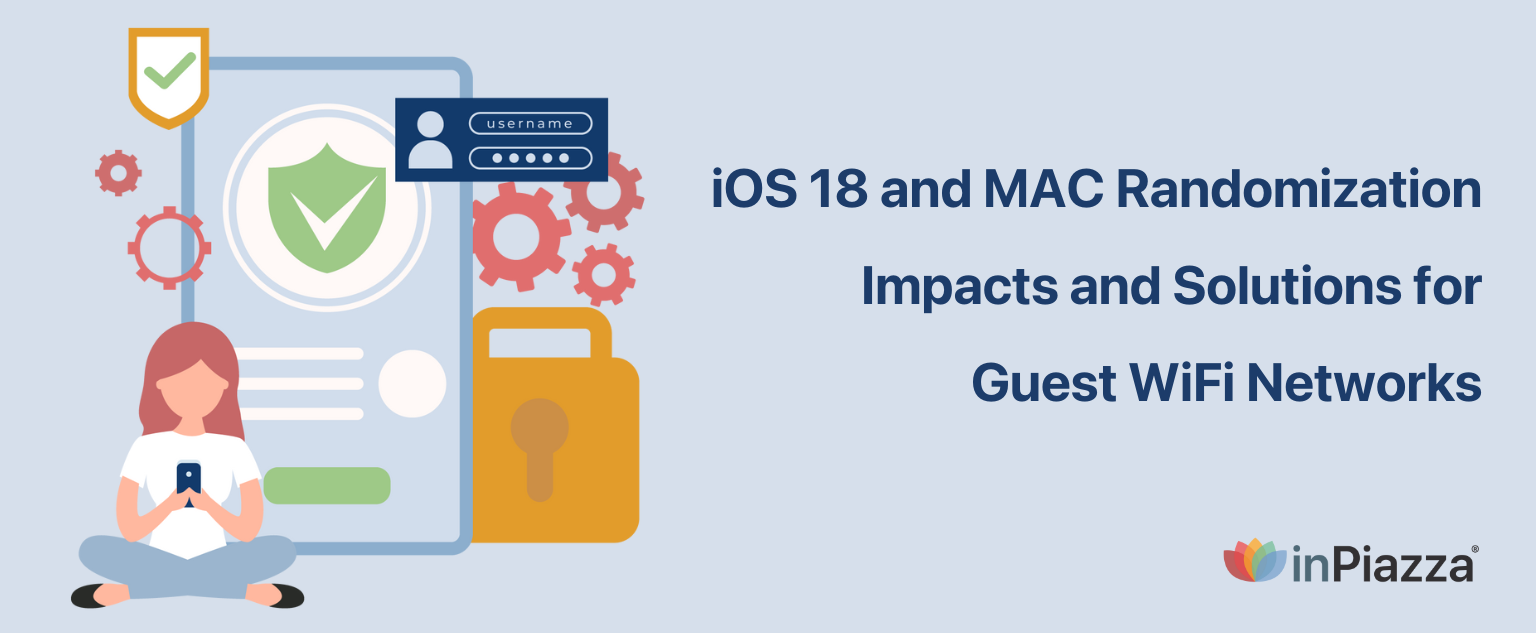
iOS 18 and MAC Randomization: Impacts and Solutions for Guest WiFi
What is MAC randomization and how does it work?
MAC Randomization is a privacy feature that allows devices, like smartphones and tablets, to periodically change their Media Access Control (MAC) address, the unique identifier used to connect to WiFi networks. Traditionally, a device’s MAC address remained static, allowing networks to identify the device and track returns over time on the same network. However, with MAC Randomization, the MAC address is automatically changed when the device connects to a new network. This makes it harder for third parties to track a user’s movement and activity across different WiFi networks, enhancing user privacy.
MAC Randomization is important because it protects users from being profiled or tracked based on their device’s MAC address, especially when they connect to public WiFi networks. It reduces the risk of personal data being collected without consent, improving online anonymity.
While this change is beneficial for users in terms of privacy, it can make it more difficult for them to access guest Wi-Fi networks in public areas, airports, shopping centers because they cannot be automatically recognized upon their return.
What’s changed with iOS 18?
With the release of iOS 18, Apple has taken MAC Randomization to the next level by increasing the frequency of MAC address rotation. Devices now change their MAC addresses more often, sometimes every two weeks or even sooner if the user manually forgets the network. This enhanced privacy feature makes it harder for WiFi networks to identify returning users or provide seamless automatic connections, as the static MAC addresses that were once used for authentication are now frequently changing.
What are the impacts on Guest WiFi networks?
The upgraded MAC Randomization in iOS 18 significantly affects Guest WiFi networks, particularly in environments that rely on identifying devices by their MAC addresses for a smooth user experience. The key impacts include:
-
Interrupted automatic login: With rotating MAC addresses, users will need to re-authenticate more frequently on Guest WiFi networks, disrupting the seamless connectivity users expect in places like shopping centers, airports, and hotels.
-
Duplicate and fragmented user data: Guest WiFi systems that track users based on MAC addresses will face data inaccuracies. As MAC addresses change, the same device may be recognized as multiple new users, leading to incorrect analytics regarding customer behavior, visit frequency, and engagement.
Solutions for addressing MAC Randomization
To overcome the challenges posed by MAC Randomization in iOS 18, network managers and IT teams must adopt more advanced solutions that do not rely on static MAC addresses for authentication and data collection. Here are several effective strategies:
-
Passpoint Hotspot 2.0: Passpoint allows for automatic, seamless WiFi connections by provisioning devices with a profile that eliminates the need for MAC-based authentication. With Passpoint, users can connect to Guest WiFi networks effortlessly, without needing to manually log in each time their MAC address changes.
-
Ask users to turn off MAC address rotation: those who want to protect their privacy and avoid tracking across different WiFi networks but still want easy login using MAC address recognition can set their iOS device to use a random but fixed MAC address (without rotation).
-
Secure Hotspot with WPA3: for networks that require enhanced security, configuring WPA3 protection on SSIDs can help mitigate the impact of MAC randomization. WPA3 enables secure authentication while preventing frequent MAC address changes, offering a more stable connection (iOS 18 rotates the MAC address only for open networks).
inPiazza solutions: Passpoint for seamless and secure Guest WiFi
At inPiazza, we recognize the significant impact of iOS 18’s MAC Randomization on Guest WiFi networks and have developed tailored solutions to help businesses overcome these challenges while ensuring a secure, seamless user experience. Here’s how the inPiazza solutions can future-proof the network:
-
Seamless WiFi access: inPiazza solutions implement the provision of a Passpoint profile to users securely. This allows users to connect to guest WiFi networks automatically and without complications, even if their MAC address changes periodically. This ensures uninterrupted and frictionless connectivity for users, making it ideal for high-traffic environments such as airports, retail centers, and hospitality venues.
-
Accurate data analytics without MAC dependency: inPiazza solutions enable your network to collect accurate usage statistics without depending on static MAC addresses. This is achieved by analyzing data from Passpoint profiles, which could be entirely independent of user identity. As a result, user privacy is fully protected, while network managers can still gain valuable insights into user behavior.
Conclusion
However, by adopting alternative solutions, businesses can ensure a seamless, secure, and reliable WiFi experience for their customers, even as the landscape of network privacy evolves.
At inPiazza, we are committed to helping our clients navigate these technological changes and ensure that their networks remain secure and user-friendly.
Are you ready for these changes yet? Contact inPiazza today to learn more.